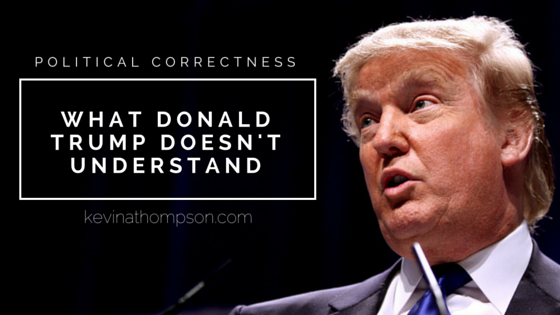One reader said I was “creating a rape culture.”
Another reader said I was a “communist.”
I’m sure Donald Trump would call me a “politically correct fool.”
The issue of political correctness is hotly debated.
During a Republican debate, Fox News commentator Megyn Kelly pressed Trump about his history of sexist comments toward women. Trump’s response was that he didn’t have time for “political correctness.” (See: 10 Communication Posts Your Co-Workers Should Read)
Following the debate Trump went on a Twitter rampage against Kelly including the insinuation that her tough questions toward him may have been because she was menstruating. When pressed about these comments, Trump once again attacked the “politically correct” crowd.
In part, Trump is right. We do have a problem with political correctness. It is limiting conversation, silencing truth, and inhibiting the political process. America is built on the idea of free debate and an open exchange of ideas. However, when the mayor of Chicago discriminates against a company because its owners believe in New Testament marriage, political correctness has gone mad. When men and women do not feel free to express their ideas, being politically correct has become an idol instead of a servant.
The desire to be politically correct should never keep someone from saying what they believe to be true. It should never hinder healthy debate. It should never cause us to outcast a person because of an idea.
Yet, what Trump fails to realize is the criticism he is receiving has nothing to do with political correctness. He is being criticized because he is wrong. He said sexist things. His disagreement with Megyn Kelly is fine, but the method of his attack is inexcusable.
When political correctness silences truth, it has gone too far. When political correctness causes us to check our language so we are not unnecessarily hurtful, it is a great gift.
Two Ways to Get This Wrong
We get this wrong in two ways:
Some expect perfection with words and become the Politically Correct Police. Any word which could be considered offensive is out of bounds. Any past example of speech, now deemed inappropriate, disqualifies the person for any recognition, position, or success.
Someone commented on one of my posts that I was “creating a rape culture” simply because I believed women’s breasts should be covered up. In her mind, it is politically incorrect to recognize the difference between men and women. (See: There Is No Need to #FreeTheNipple)
Others believe any discussion regarding language is a sign of political correctness gone mad. They rebuke the idea that some words are wrong and should no longer be used. They will intentionally use words and symbols (sexist terms, the Confederate flag, etc.) to make their point. They unashamedly hurt others to express their rights.
Many people have fought back against my request that we eliminate the R-word from our language. Instead of listening to my experience as a father of a special needs child, they demand their rights and claim it is just a word. While I fight for their right to say the word, I will also speak to their conscience to choose a better word. One reader claimed I was “communist” because of this article. He failed to understand the difference between speaking truth which offends and speaking in an offensive manner. (See: If This Offends You, I’m Not Sorry)
How to Get It Right
We miss the truth with political correctness whenever we believe either extreme view–it’s all right or it’s all wrong. We understand it properly whenever we discern our ability to choose better words while also telling the truth.
Truth cannot be limited. We must speak it freely. Opinions will differ. Others will believe things we do not believe. They have every right to express their opinions. We have every right (and often a responsibility) to speak our opinions even if they offend others. (See: The Number One Rule of Disagreement)
However, if we can choose a better word or phrase without changing the message, we must do so. We must understand, while our intent is the most important thing, our words also matter. If we can make the same point with a different word, why not choose a different word?
Generally speaking, I’ll call you whatever you want me to call you. But I’ll speak of your actions however I wish. For example, if you consider a word offensive, I won’t use it in reference to you. However, if you consider my opinion about a topic to be offensive, I will not apologize for my point of view. So I’ll call you by whatever name you wish–Bruce or Caitlyn–but I will not withhold my belief that gender is not a choice. (See: 10 Responses on the Bruce Jenner Interview)
Two Responses
In light of this discussion, we must do two things.
- We must choose our words wisely. There is no reason to be intentionally or ignorantly hurtful. Listen, learn, and do better. (See: No Words Are Perfect)
- We must be extremely gracious with others. Because we all say stupid things on a daily basis, it should give us a deep compassion toward others when they say something they shouldn’t. While we should help them with their speech, we should not judge them because of it.
No words are perfect. We shouldn’t expect others to speak perfectly and we shouldn’t expect it from ourselves. Speaking perfectly is not possible. But we can improve. We can learn from others and choose better words. As we do, we must also demonstrate the courage to speak the truth even if others are offended by it.




7 Responses to Political Correctness: What Donald Trump Doesn’t Understand